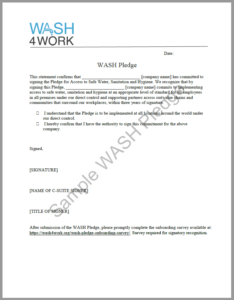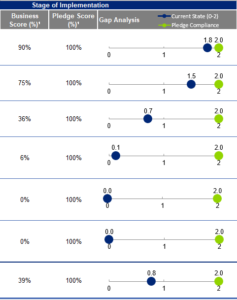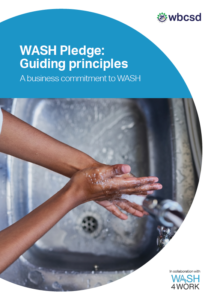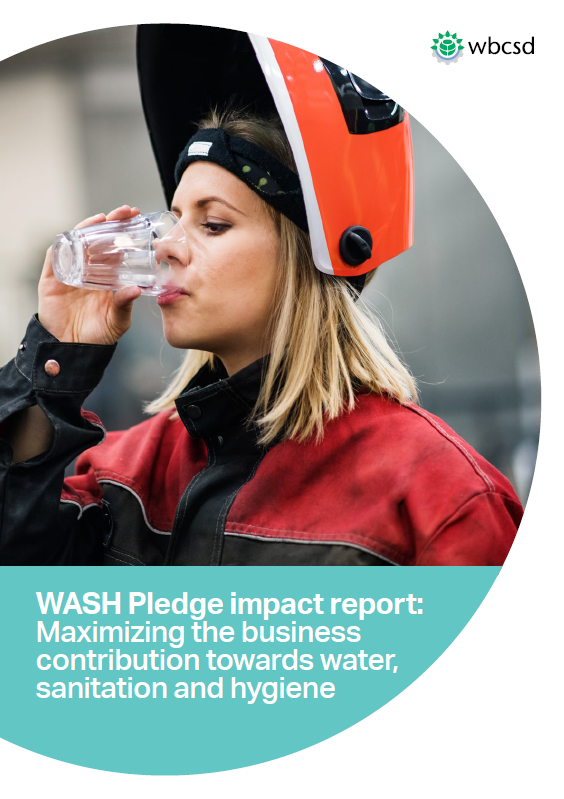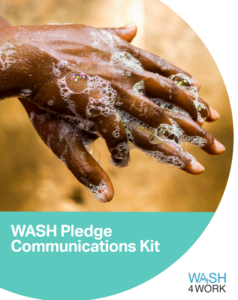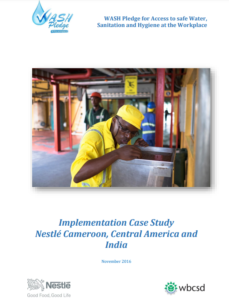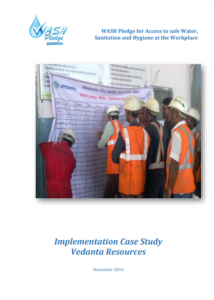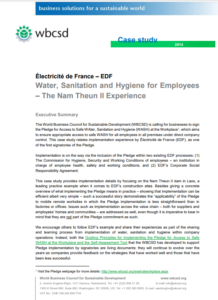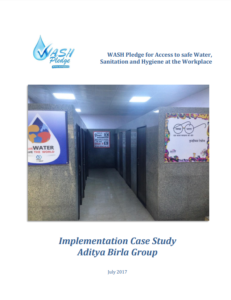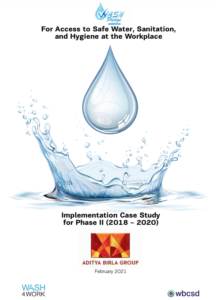Why sign the WASH Pledge?
The recent UN report on Summary Progress Update 2021: SDG 6 — water and Sanitation for all highlights that 46% of the world’s population lacks safely managed sanitation services, 29% lack basic hand washing facilities and 26% lack safely managed drinking water services. The need for corporate action to help achieve SDG 6 and the material benefits that supports business resilience and sustainability is evident from The business case for action on WASH.
The Pledge allows businesses to:
- Demonstrate leadership in setting a higher standard for the health and safety of company employees, value chains and communities.
- Generate impact by contributing to the implementation of the SDGs.
- Reap business benefits by investing in a healthier and more productive workforce and strengthening their social license to operate.
- Be connected to peers and partners active in this space through the WASH4Work initiative.
What could business do?
The WASH Pledge for access to safe water, sanitation and hygiene (WASH) is an opportunity for companies to contribute concretely to the implementation of SDG 6, while at the same time ensuring that they provide international best practice on WASH.
By signing the WASH Pledge, companies commit to implementing access to safe water, sanitation and hygiene at the workplace at an appropriate level of standard for all employees in all premises, under their control within three years of signature. Under the Pledge, companies also commit to taking action on WASH across their value chain, including among their suppliers, as well as in the communities that surround their workplaces and/or where their workers live.
By signing the Pledge, a company commits to the following steps within three years of signing:
- Implementing access to safe water, sanitation, and hygiene (WASH) at an appropriate level of standard for all employees in all premises under their direct control
- Supporting partners across their value chains and communities that surround their workplaces or where their workers live.
- The requirements of the Pledge are outlined in the WASH Self-Assessment Tool
- To sign the WASH pledge, a C-level representative must Complete the WASH Pledge form and answer all questions.
Starting in 2025, WASH4Work will no longer display logos of signatories.
Due to the number of signatories increasing dramatically, we will instead be dispaying names, industry sector, and country in the coming days.
WASH Self Assessment Tool
The WASH Pledge Self- Assessment Tool is a facility level excel-based tool that helps companies assess the level of WASH facilities, help identify gaps in comparison to leading international practices as well as evaluate the implementation on yearly basis. It helps companies to measure, set targets and monitor progress based on the compliance score calculated by the tool for each criterion and thus supports decision making regarding investment and priority action.
Once completed, it provides an overall rating for the assessed facility based on each of the categories below:
- General
- Workplace Water Supply
- Workplace Sanitation
- Workplace Hygiene
- Value/Supply Chain WASH
- Community WASH
The self-assessment tool is now available for download in English and Spanish.
For instructions on how to use the tool, please refer to Page 24 on the WASH Pledge: Guiding Principles or the cover tab of the Self-Assessment tool.
WASH Pledge: Guiding Principles
This publication includes a set of guiding principles that will support companies in their efforts to implement WASH at the workplace – an essential first step for businesses supporting global objectives related to drinking water, sanitation and hygiene. This document also provides guidance and tools to help businesses assess their WASH conditions at the workplace, as well as along its value chain, including suppliers and surrounding workplace and/or worker communities.
As you read through the guiding principles and begin to assess and implement WASH within your operations, we encourage you to share your experiences with us so that others can benefit from what you have learned. In this rapidly evolving global economy, where social license to operate, reputational risk and access to natural resources have become increasingly important to success, WASH should be a key aspect of any company’s sustainability strategy.
WASH Pledge impact report: Maximizing the business contribution towards water, sanitation and hygiene
This publication provides a business case for companies to implement WASH at the workplace and it also showcases the action that signatories of the WASH at the workplace Pledge have taken to improve access to water, sanitation and hygiene (WASH).
The business case for investing in WASH is clear. While every dollar invested returns USD $5 in benefits for sanitation and USD $2 for water, one in every three people still goes without access to safe sanitary facilities and one in every ten does not have access to clean and safe water when needed. The impact potential for WASH investments is immense.
For this reason, 47 companies have committed and are implementing the WASH Pledge, touching over 2.4 million employees in close to 6,000 sites in 170 countries. By signing the WASH Pledge, companies ensure that within three years, all their employees in operations across the globe have access to water and sanitation, and that the company takes an active role in promoting safe hygiene practices at work and beyond. The WASH Pledge Self-assessment tool lays out 32 provisions on what is considered international best practice on WASH at the workplace.
WASH Pledge Communications Toolkit
The WASH Pledge communications toolkit has been created for signatories of the WASH Pledge.
Please use this communications toolkit to help spread the word about your commitment to invest in a safer, healthier, more productive workforce.
- Use the information provided here as a guidance for your media releases or news alerts.
- Use the sample social media posts to announce your pledge commitment. Please make sure you tag us so that we can share your commitment to ensuring WASH in your business.
- Encourage other businesses or peers to join the commitment by sharing the link to the WASH pledge site.
- You can use the resources provided in the toolkit to be circulated amongst your staff/stakeholders and spread the word.
- We encourage all Pledge signatories to submit a case study after implementing the Pledge in their business. Please refer to the case study template provided in this toolkit for guidance.
Implementation Case Study: Nestlé (2016)
This case study sheds light on the implementation of the WASH Pledge in Nestlé Central America, India and Cameroon, three markets that have been particularly active on WASH. Nestlé is a founding member of the WBCSD Pledge for Access to safe Water, Sanitation and Hygiene (WASH) at the workplace, and was one of the first companies to join the initiative in September 2014. As co-chairs of the WASH Pledge, the pledge ledge has been rolled out globally within Nestlé.
Implementation Case Study: Vedanta (2016)
This case study sheds light on the implementation of the Pledge at global level specifically in the aluminum and zinc sectors in India. Vedanta Resources signed the WBCSD Pledge for Access to safe Water, Sanitation and Hygiene (WASH) at the workplace in October 2014. The company is implementing the WASH Pledge in all of its sites, and is also assisting the WBCSD in raising awareness on the issue of WASH at the workplace. The company’s leadership demonstrates their commitment through internal and external communication.
Implementation Case Study: Électricité de France (2014)
This case study provides implementation details by focusing on the Nam Theun II dam in Laos, a leading practice example when it comes to Électricité de France (EDF)’s construction sites. Besides giving a concrete overview of what implementing the Pledge means in practice – showing that implementation can be efficient albeit very simple – such a successful story demonstrates the “applicability” of the Pledge to mobile remote worksites in which the Pledge implementation is less straightforward than in factories or offices. Issues such as implementation across the value chain – both for suppliers and employees’ homes and communities – are addressed as well, even though it is imperative to bear in mind that they are not part of the Pledge commitment as such.
Implementation Case Study: Aditya Birla Group Phase 1 (2017)
This case study highlights the Phase 1 efforts of Aditya Birla Group for implementation of the WASH Pledge in 243 sites across all geographies. The Aditya Birla Group signed WBCSD Pledge for Access to safe Water, Sanitation and Hygiene (WASH) at the workplace in January 2015. The pledge catapulted the Group’s efforts that all their businesses provide access to safe drinking water, sanitation and hygiene to their workforce within the boundaries of their premises, across all operations and geographies.
Implementation Case Study: Aditya Birla Group Phase 2 (2021)
This case study highlights the continuing efforts of Aditya Birla Group for implementation of the WASH Pledge in 243 sites across all geographies.
December 2022 – Introduction for WASH Pledge Suppliers
Session 1
Session 2
December 2022 – Current Leading Practice on WASH in the Supply Chain
Session 1
Session 2
June 24, 2020 – WASH4Work Pledge 2.0 Webinar


